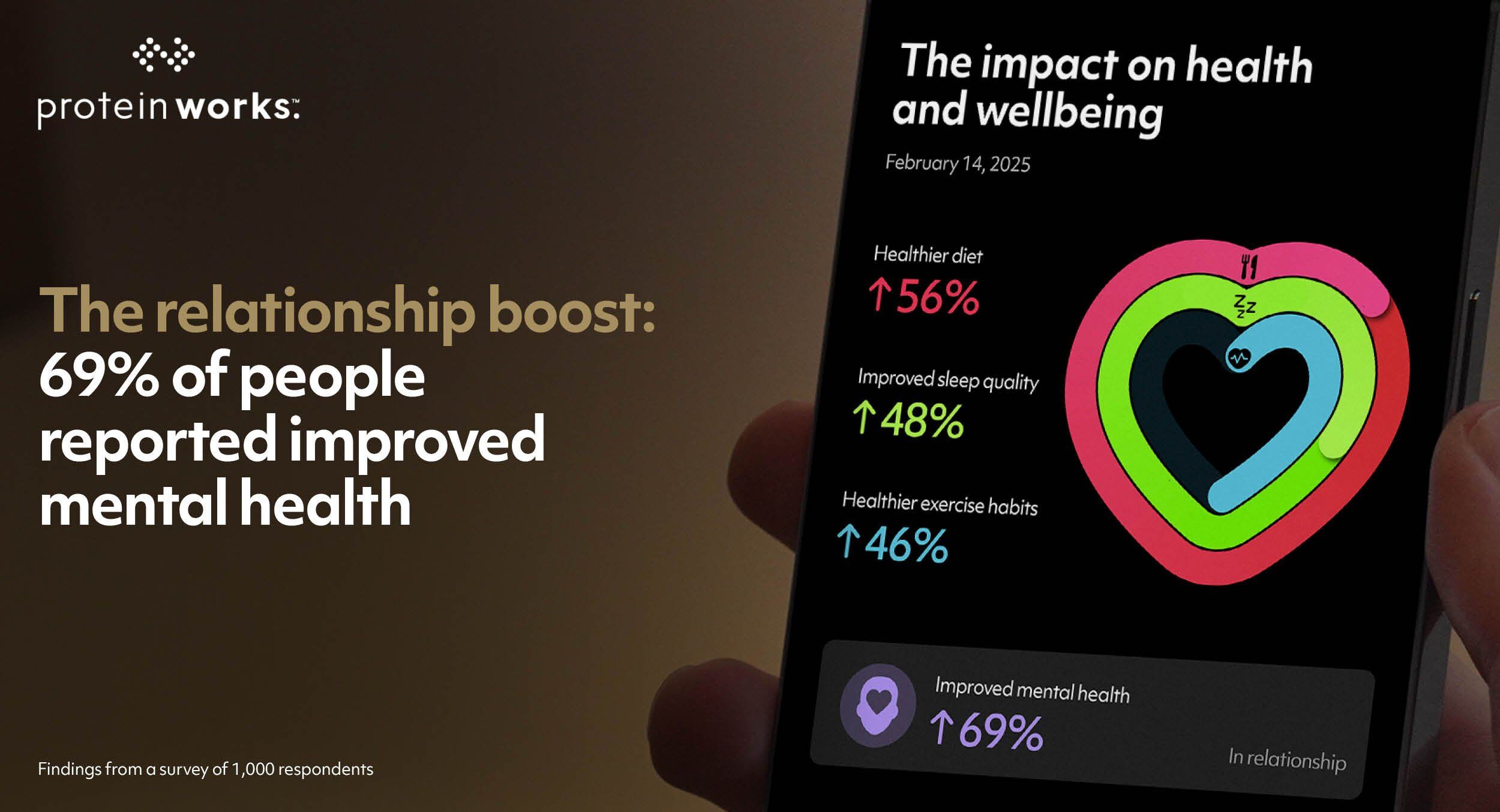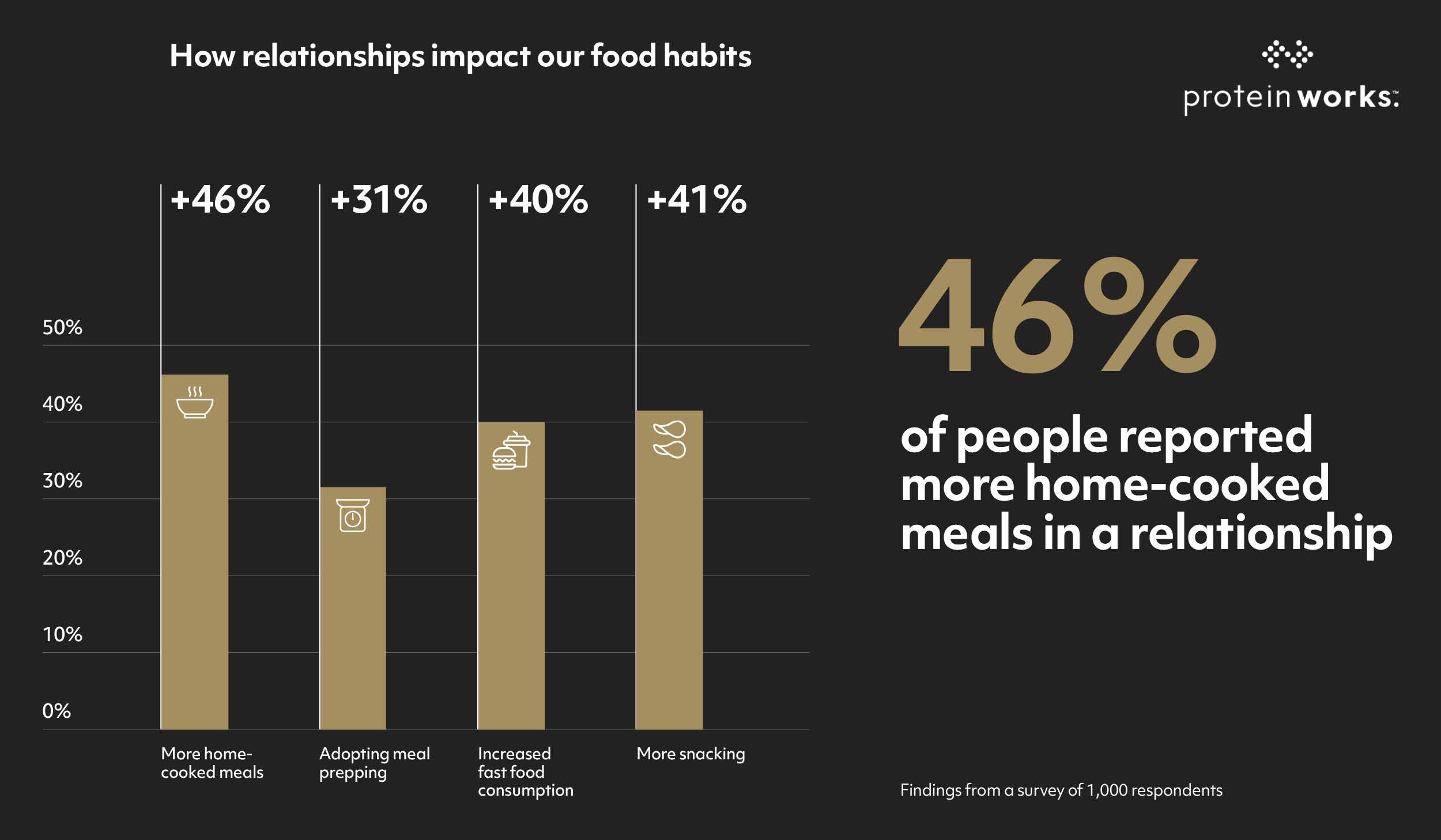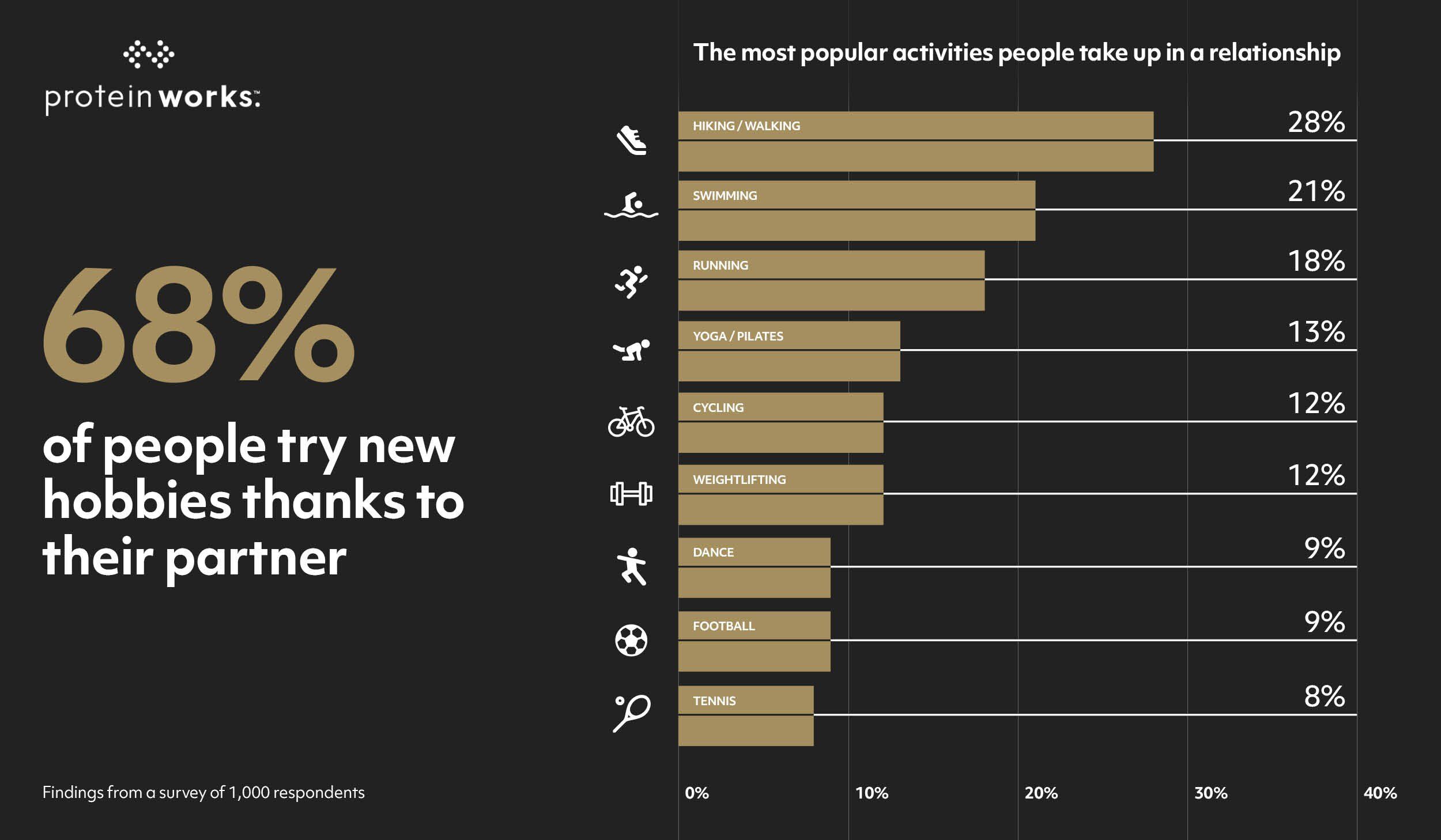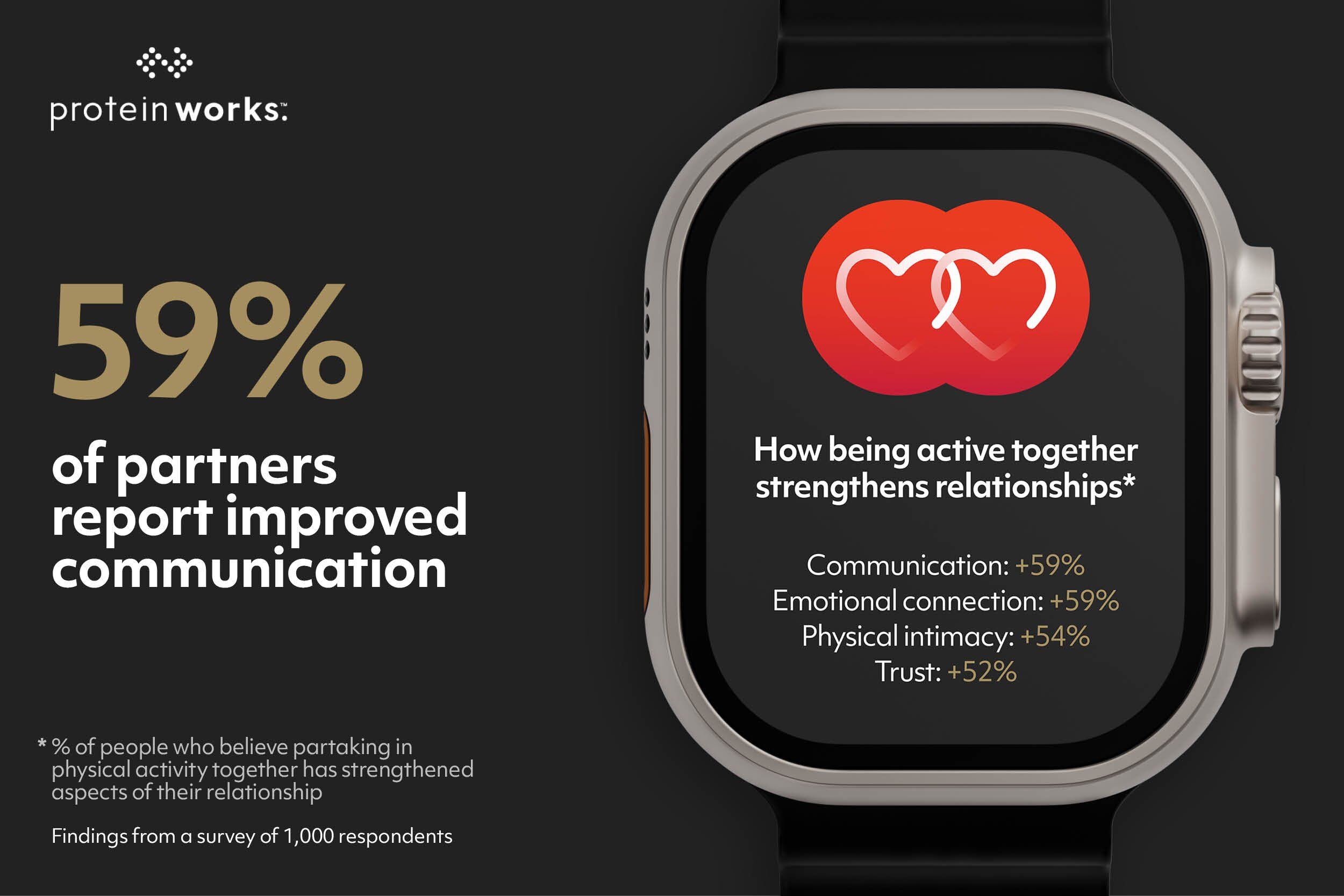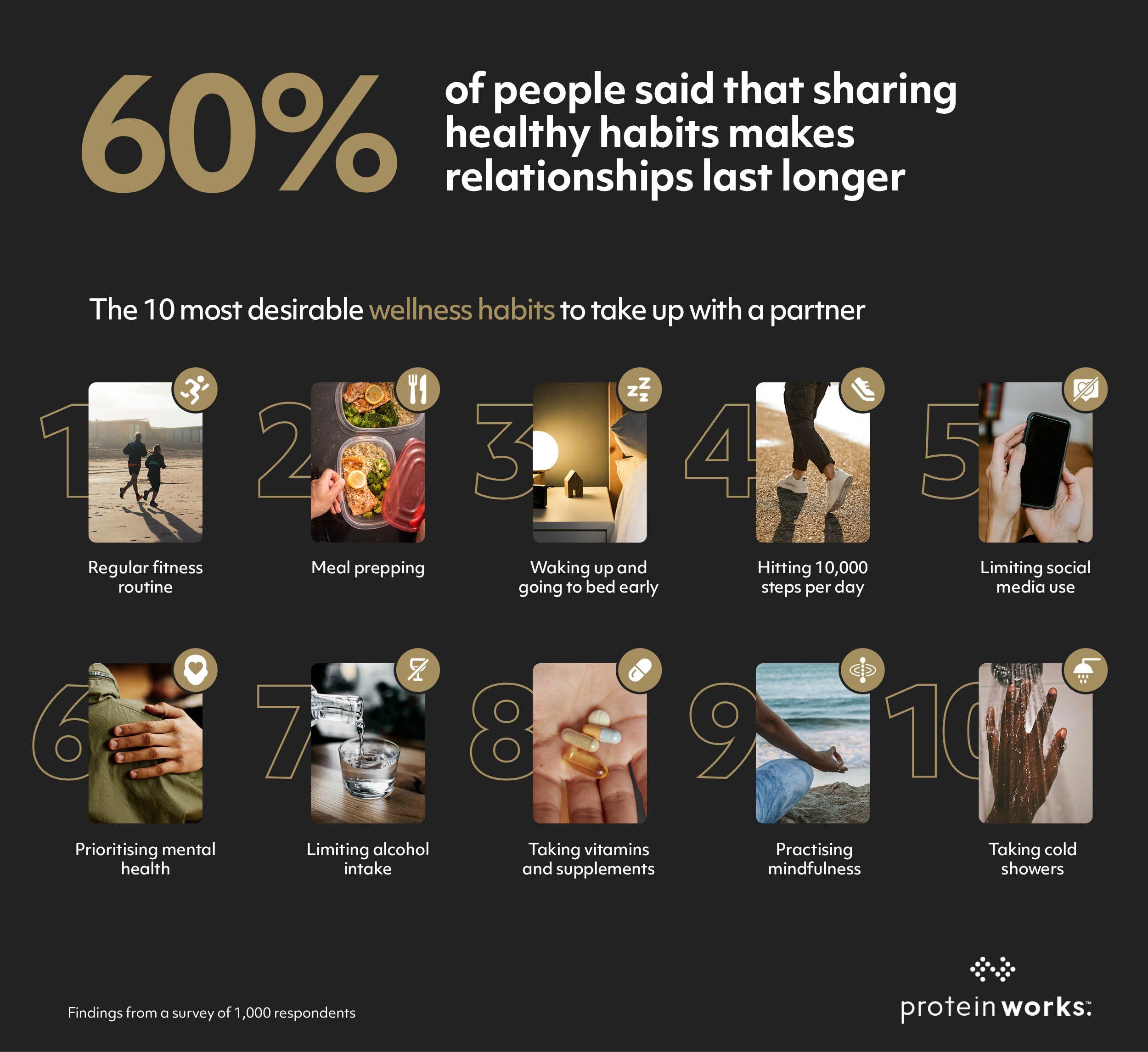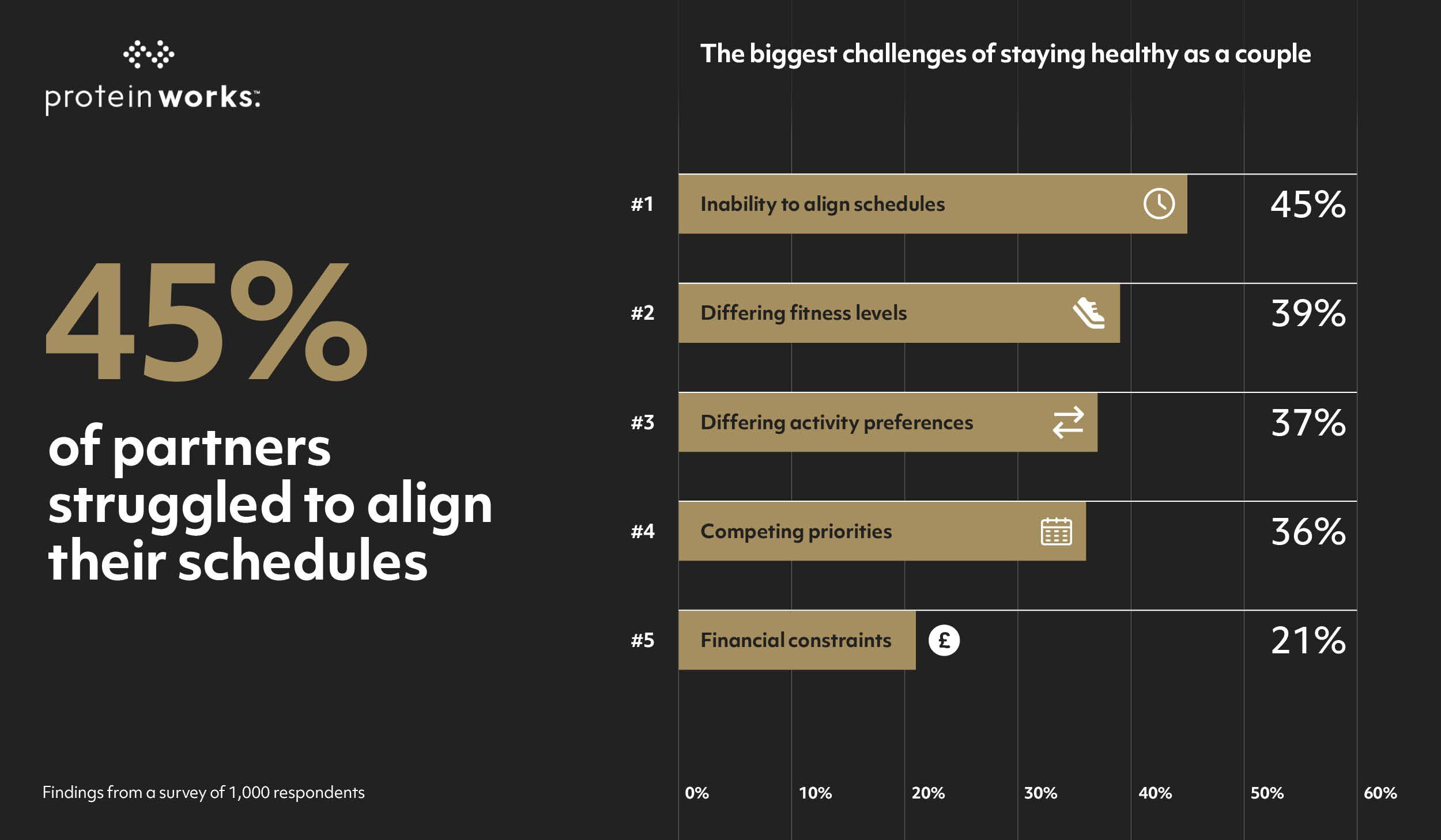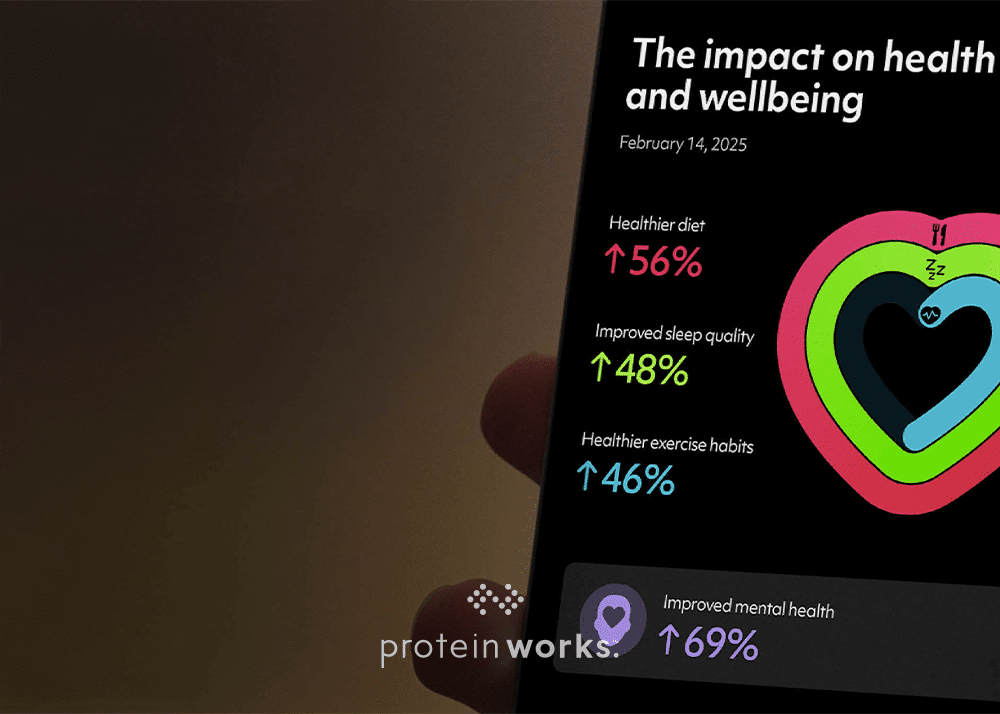
Are We Stronger Together? New Study Reveals How Relationships Impact Health & Nutrition
Being in a relationship can do more than just provide emotional support—it can lead to measurable health benefits. Here at Protein Works, we’ve conducted a new study to explore how relationships impact health, surveying 1000 people. The data reveals that relationships significantly impact diet, exercise, and overall wellness, showing a direct connection between a strong romantic partnership and health. However, they also bring some surprising contradictions—let’s just say, “it’s complicated.”
Our findings align with previous research which demonstrated that couples’ shared lifestyles and habits influence their health outcomes [1]. The study found that health inequalities are often larger between households than between individuals, making a case for targeting health policies at couples.
Building on this idea, our survey offers fresh insights into how love and wellness intersect, highlighting the tangible benefits of a healthy relationship and providing takeaways to help you make the most of your health journey—whether you’re coupled up or flying solo. Lets dive into exactly how relationships impact health and wellness:
Are We Really Stronger Together? The “Relationship Effect” On Overall Well-being
The survey found that more than half of respondents (54%) felt their habits around diet, exercise, and sleep improved when they were in a relationship. Of these, 19% felt “significantly healthier” with a partner, while 35% reported feeling “somewhat healthier.” In comparison, only 6% felt significantly healthier when single.
However, it’s not all smooth sailing. 23% of respondents said they saw no difference in their habits, suggesting that not every relationship fosters health improvements—and for some, external factors like busy schedules or differing priorities and fitness levels might play a role.
The Numbers Behind Relationship Health Benefits
The data reveals a clear link between supportive relationships and improved health outcomes. The survey found that being in a relationship positively influences multiple aspects of health:
- Diet: Over half of the respondents (56%) reported a healthier overall diet when in a relationship. Of which 17% report a “significant” improvement in consuming more balanced and nutrient-dense foods.
- Sleep quality: Almost half (48%) of respondents reported improved sleep in a relationship, likely due to reduced stress and emotional support. Meanwhile, 31% noticed no change, and only 3% reported their sleep was “significantly worse.” This suggests that relationships generally have a positive or neutral impact on sleep quality.
- Exercise: Just under half of the respondents (46%) noted that their exercise habits improved with a partner. While being in a relationship might be a great motivator, it isn’t enough to notice a significant improvement as 32% reported no changes.
- Mental health: Being in a relationship has proven to be the biggest boost for mental well-being, with an overwhelming 69% saying their mental health improved in a relationship.
The Sweet (and Salty) Side of Coupledom
Relationships can impact health by exposing individuals to new health behaviours, often fostering the adoption of healthier habits, particularly in regards to diet. The survey findings reinforce this, showing how couples influence each other’s dietary choices and contribute to the development of more health-conscious routines.
The most common wellness habit influenced by a partner is cooking more home-cooked meals, with 46% of respondents reporting this shift. Meal prepping follows closely at 31%, highlighting the role partners play in encouraging healthier eating practices. A quarter of respondents (25%) are taking more vitamins and supplements due to a partner, showing how relationships can increase awareness of nutritional deficiencies and encourage a more proactive approach to daily health. These habits all reflect a shared commitment to better health, saving time, and creating more consistent, nutritious routines together.
Interestingly, while relationships seem to promote healthier habits overall, they can also lead to more indulgence. The survey revealed that 40% of people consume more fast food when they’re in a relationship, while 41% snack more frequently; whereas 29% and 22% respectively reported indulging less.
Fitness as a Foundation for Connection
Putting yourself out there to try new hobbies can be daunting as an adult, especially if it’s not something you’ve been exposed to growing up. However, this is where being in a relationship has been proven to show huge benefits. Over two-thirds of respondents (68%) have reported adopting a new sport or hobby because of their partner, highlighting a new willingness to try different fitness activities.
The study also underscores the importance of accessibility in fitness choices for couples. The most popular activities couples were inspired to try included walking and hiking (28%), swimming (21%), and running (18%). These options reflect how accessible, low-cost activities can encourage greater participation, making it easier for partners to integrate physical activity into their routines.
From hitting the trails to making waves, exercising together strengthens both bodies and bonds—proving that couples may in fact be stronger together compared to singletons.
One of the most compelling findings from the survey is how these shared fitness activities strengthen relationships themselves. Over 59% of respondents said working out or playing sports together improved their emotional connection, while 54% noted a boost in physical intimacy. Communication (59%) and trust (52%) between romantic partners also improved through shared physical activities.
These findings suggest that shared movement isn’t just beneficial for individual health. It actively reinforces key aspects of a strong, functional relationship.
Health & Fitness Advisor Fraser Richardson explains why this may be the case:
“Exercising together builds more than just fitness —it builds trust, teamwork, and a shared sense of achievement. Even something as simple as going for a run or a home workout can create opportunities for connection and communication.
Being active together reinforces consistency, accountability, and a shared commitment to long-term fitness, helping both partners stay strong—physically and emotionally.”
Overall, the study concluded that fitness and wellness habits can be powerful tools for building stronger, more resilient partnerships. 60% of people said that maintaining healthy habits together contributed to the longevity of their relationship. Aligning these goals could then make you stronger together!
When asked which habits they’d most like to engage in alongside their partner, the results revealed some clear preferences.
Maintaining a regular fitness routine was the top healthy habit partners wanted in their relationship. Meal prepping followed closely, showing the value of nutrition-focused collaboration. While mindfulness and mental health practices mattered, physical health habits took priority. Waking up early and hitting 10k steps daily were especially important. This reflects the need for routines that create a strong, active foundation for a healthier lifestyle together.
Engaging in these habits isn’t just about health. The survey found a strong connection between healthy routines and increased attraction. Over 71% of respondents said they find their partner more attractive when they exercise or eat well. This highlights how physical health and fitness signal discipline, vitality, and self-care—qualities many people find appealing.
The Challenges of Staying Healthy as a Couple
Despite increased attraction and the desire to become healthier together, maintaining shared health habits isn’t always easy. The biggest barriers cited were:
- Time management: Nearly half (45%) of respondents struggled to align their schedules to make time for health and fitness together.
- Differing fitness levels: 39% noted this as a challenge, alongside differing activity preferences (37%).
- Competing priorities: Work, family, and other commitments were significant obstacles for 36% of couples.
- Financial constraints: 21% revealed that wellness activities need to be affordable to remain accessible.
Fraser Richardson advises:
“The key to overcoming these challenges is compromise and creativity. Find activities that fit into your lifestyle and don’t require a big investment of time or money. Even something as simple as preparing meals together or taking a 20-minute walk after dinner can make a big difference.”
Key Takeaways for Long-Term Relationship Wellness
The survey findings confirm that relationships impact health and wellness habits significantly. While emotional connection is important, shared routines—such as exercising together, cooking nutritious meals, and supporting each other’s wellness goals— drive measurable improvements in physical and mental well-being.
However, maintaining these habits requires effort, balance, and adaptability. By prioritising health as a team, couples can strengthen not only their individual well-being but also the foundation of their relationship, fostering resilience, connection, and longevity.
When partners commit to a healthier lifestyle together, they’re not just investing in their well-being. They also build a stronger, more resilient relationship for the long haul.
Source:
[1]: https://www.understandingsociety.ac.uk/news/2017/11/01/partners/
Methodology:
The survey was conducted using Pollfish, targeting a UK audience and collecting a total of 1,000 responses.


